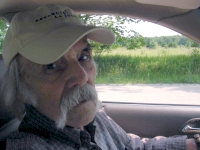
Poetry Dispatch No. 262 | December 30, 2008
Christmas to New Year (2009)
“Memoir” Dispatches, #6
Editor’s Note: This is the sixth, end-of-the-year/holiday offering in words to date as I consider the various interpretations of December, winter, Christmas, the coming year. Previous postings include: “Down to the Lake”, “Carol Ordal” , a winter haiku by Imakito Oku at ; “Garrison Keillor” , and a winter haiku by Buson . Today’s “almost New Years” poem by Transtromer will appear in the “Poetry Dispatch” archived version within hours. —Norbert Blei
![]()
TOMAS TRANSTRÖMER
STANDING UP
In a split-second of hard thought, I managed to catch her. I stopped, holding the hen in my hands. Strange, she didn’t really feel living: rigid, dry, an old white plume-ridden ladies’ hat that shrieked out the truths of 1912. Thunder in the air. An odor rose from the fence-boards, as when you open a photo album that has got so old that no one can identify the people any longer.
I carried her back inside the chicken netting and let her go. All of a sudden she came back to life, she knew who she was, and ran off according to the rules. Hen-yards are thick with taboos. But the earth all around is full of affection and tenacity. A low stone wall half overgrown with leaves. When dusk begins to fall the stones are faintly luminous with the hundred-year-old warmth from the hands that built it.
It’s been a hard winter, but summer is here and the fields want us to walk upright. Every man unimpeded, but careful, as when you stand up in a small boat. I remember a day in Africa: on the banks of the Chart, there were many boats, an atmosphere positively friendly, the men almost blue-black in color with three parallel scars on each cheek (meaning the Sara tribe). I am welcomed on a boat—it’s a canoe hollowed from a dark tree. The canoe is incredibly rocky, even when you sit on your heels. A balancing act. It you have the heart on the left side you have to lean a bit to the right, nothing in the pockets, no big arm movements, please, all rhetoric has to be left behind. It’s necessary: rhetoric will ruin everything here. The canoe glides out over the water.
from FRIENDS, YOU DRANK SOME DARKNESS, Three Swedish Poets, Martinson, Eklelöf, and Tranströmer; Chosen and Translated by Rober Bly, A Seventies Press Book published by Beacon Press, Boston, 1975
![]()
 Tomas Tranströmer (born 15 April 1931) is a Swedish writer, poet and translator, whose poetry has been deeply influential in Sweden, as well as around the world.
Tomas Tranströmer (born 15 April 1931) is a Swedish writer, poet and translator, whose poetry has been deeply influential in Sweden, as well as around the world.
Tranströmer received his secondary education at the Södra Latin School in Stockholm and graduated as a psychologist from Stockholm University in 1956. He began writing at thirteen, and published his first collection of poems, 17 dikter (Seventeen Poems) in 1954. His latest collection, Den stora gåtan (The Great Enigma), was published in 2004, and an English translation of his entire body of work, The Great Enigma: New Collected Poems, was published in 2006. He published a short autobiography, Minnena ser mig (The memories are watching me), in 1993.
Other poets – especially in the “political” 70’s – accused him for being apart from his tradition and not including political issues in his poems and novels. His work, though, lies within and further develops the Modernist and Expressionist/Surrealist language of 20th century poetry; his clear, seemingly simple pictures from everyday life and nature in particular reveals a mystic insight to the universal aspects of the human mind.
Tranströmer and the American poet Robert Bly are close friends and their correspondence has been published in the book Air Mail.
In 1990, he suffered a stroke that affects his speech, but he continues to write. He has often been mentioned as a candidate for the Nobel Prize in Literature, and many consider him one of Sweden’s foremost poets. Tranströmer’s awards include the Bonnier Award for Poetry, the Neustadt International Prize for Literature, the Oevralids Prize, the Petrach Prize in Germany,the Golden Wreath of the Struga Poetry Evenings and the Swedish Award from International Poetry Forum. His poetry has been translated into fifty languages; Bly, Robin Fulton, and the prominent American blues writer Samuel Charters have translated his work into English.
In 2007, Tranströmer received a special Lifetime Recognition Award given by the trustees of the Griffin Trust for Excellence in Poetry, which also awards the annual Griffin Poetry Prize.
In addition to his work as a writer, Tranströmer was also a respected psychologist before he had his stroke. He worked in juvenile prisons, and with disabled, convicts, and drug addicts. He is also a good piano player, something he has been able to continue after his stroke, albeit with one hand.
Collected poems
- * 17 dikter (1954) – Seventeen Poems
- * Hemligheter på vägen (1958)
- * Den halvfärdiga himlen (1962) – The Half-Finished Heaven
- * Klanger och spår (1966) – Windows and Stones
- * Mörkerseende (1970) – Night Vision
- * Stigar (1973) – Paths
- * Östersjöar (1974) – Baltics
- * Sanningsbarriären (1978)
- * Det vilda torget (1983)
- * För levande och döda (1989) – For the Living and the Dead
- * Sorgegondolen (1996)
- * Den stora gåtan (2004)
- * The Great Enigma: New Collected Poems (2006) – Translated by Robin Fulton
- * Galleriet: Reflected in Vecka nr.II (2007)- an artist book by Modhir Ahmed



























































Leave a comment